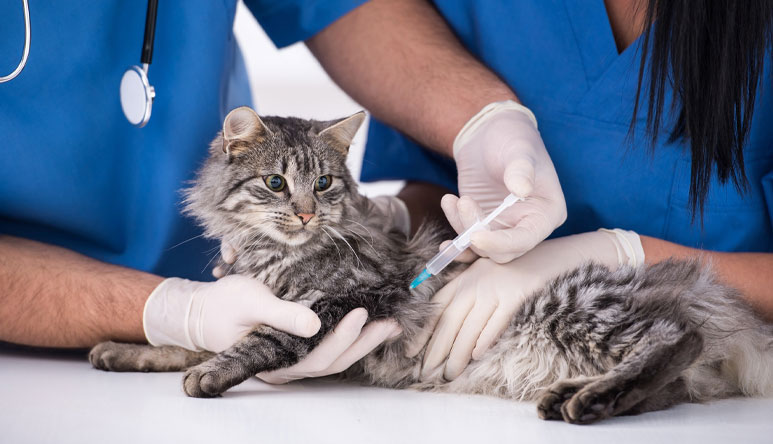1. Protects your pet
If your cat is vaccinated, he/she is protected from a number of serious, preventable, diseases. If your cat slips out the door or is contact with other outdoor pets in your home, your cat needs certain vaccines in order to reduce the risk of contracting a preventable disease, thereby helping her live a longer, healthier life. A vaccinated cat will be resistant to the diseases for which he/she is immunized for. Some viruses are hardy and can live on hard surfaces and even handling an infected cat can transfer a virus to your own healthy indoor cat once you’re home. Some diseases can be life threatening and can be very costly treat. An ounce of prevention is worth a pound of cure!
2. Protects other pets
If you don’t vaccinate your cat, you could be putting other pets (and even people) at risk. While vaccines are one of the greatest medical advances of modern time, vaccines are not 100% effective and they don’t provide all cats with the same level of protection. An unvaccinated cat can transmit diseases to other cats. If those cats are immune compromised, they may not be able to fight off the infection, even though they may be vaccinated. If your cat contracts rabies, it can be transmitted to you or members of your family.
3. It’s the law
In many areas of the United States and Canada, rabies vaccines are mandatory, regardless of whether your cat lounges indoors all day or ventures out into your yard. One of the most common carriers of the rabies virus are bats, and bats are notorious for finding their way into homes, cottages, and cabins. Curious cats have been known catch, eat, and play with bats once they find their way into homes. Bat teeth are so tiny that it’s difficult to know if your cat was bitten. While not all bats carry rabies, it’s impossible to tell just by looking at it. Protect your cat from this fatal, yet preventable disease.
4. Your cat’s lifestyle could change
Sometimes, life as we know it changes unexpectedly. Maybe you were living in an apartment and your cat never went out, but now you’ve found a house that has a big backyard and you’ve decided to let your cat outside. Your living arrangements may change to a situation where your indoor cat is now living with outdoors cats that could transmit disease. If your cat becomes, OR is exposed to outdoor cats for whatever reason, he/she must be vaccinated for full protection.
5. Boarding facilities require certain vaccinations
Planning a vacation and boarding your pet? Check any boarding facility website, and you’ll see that most require that your pet be up to date on his/her vaccinations. Of course, this makes sense—having pets boarded without vaccines is risky. Cats are often in close quarters and viruses such as respiratory infections can easily spread between cats.
As we enter the new normal of COVID-19, be sure that your cat is up to date on her vaccinations!
